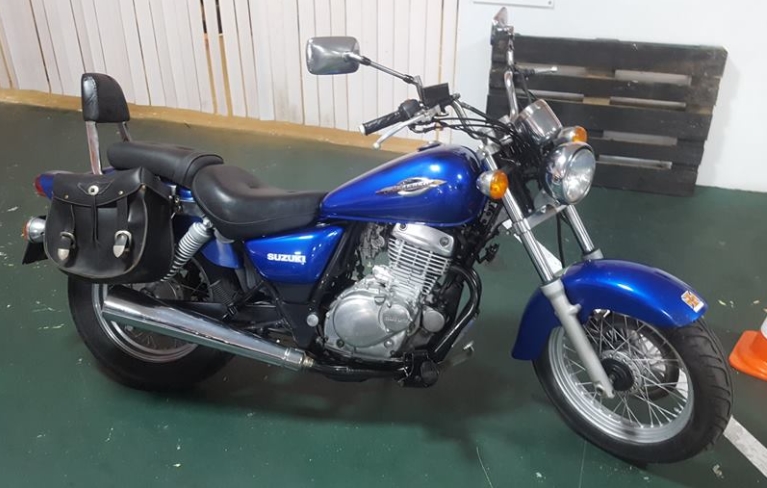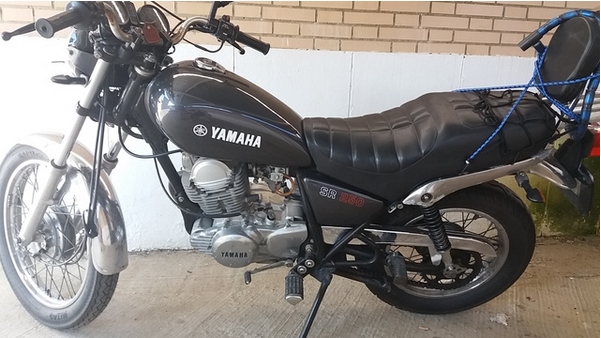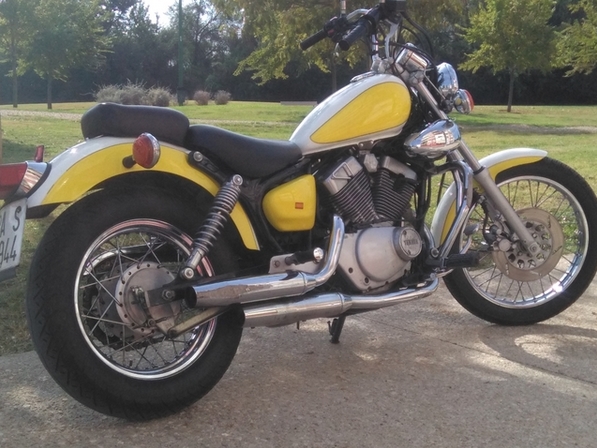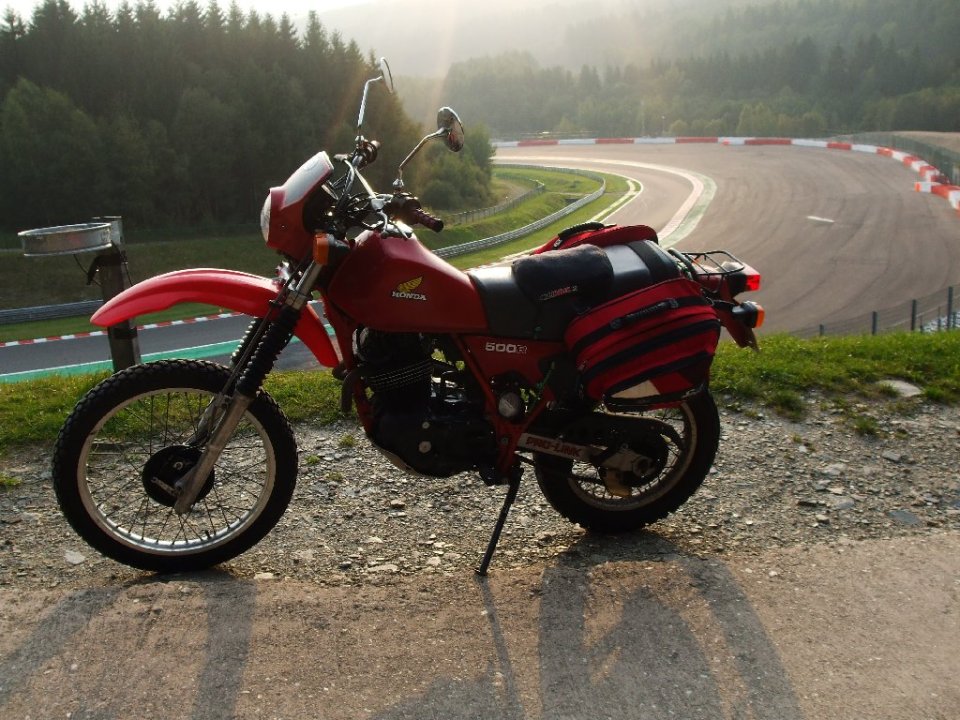I bought a motorcycle helmet recently. It cost €5 and I got it at a car boot sale. I can almost hear the disapproving sucking in of breath from you, dear readers, but is buying a used bike helmet really a safety issue? Should I be spending more money on this item of bike gear?
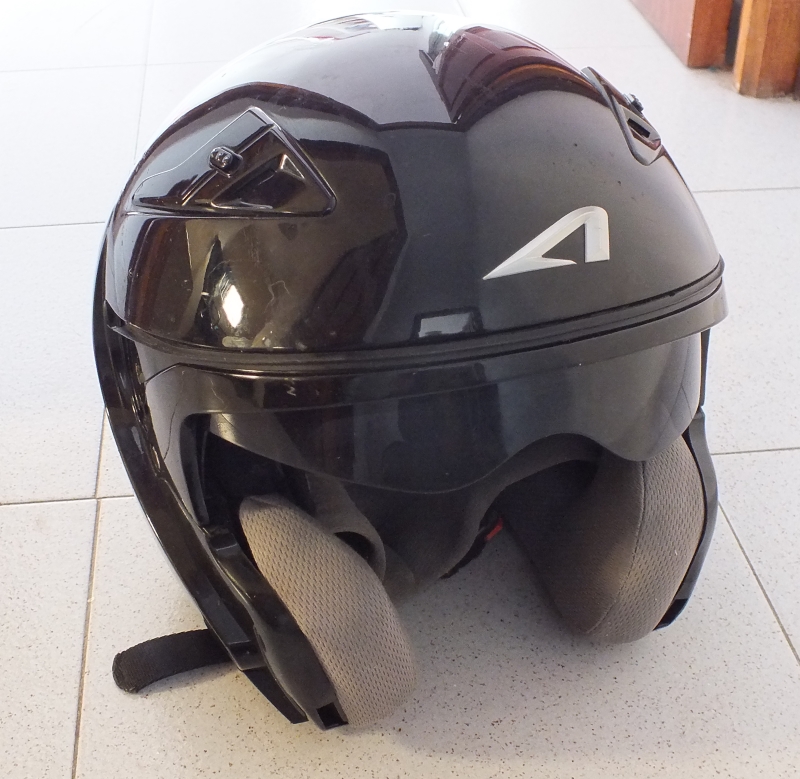
My €5 Helmet. I removed the lining to wash it and checked the internal and external shells and it’s in pretty good shape. Fits well, too…
Wearing a helmet on a motorcycle is clearly a good idea. Even leaving aside what happens if you fall off, getting hit by road debris or even large insects is a problem – you don’t have to be going very fast for a bee up the nose to spoil your whole day. But, like many motorcyclists, I have in the past felt the need not just to have a helmet, but to have the latest and very best helmet I could afford.
Bell, Shoei, Akai – Over the last forty-odd years (I started riding motorcycles in 1977) I have owned some of the nicest and most expensive motorcycle helmets around. However, now that I’m older and wiser (OK, let’s settle for ‘older and a little less stupid’) and interested in the whole more for less thing, I wonder whether I really need to spend a lot of cash on the very latest race-rep lid?
Statistics (and is there anything more confusing that statistics?) show that the speed of the average motorcycle accident is around 20 – 21mph. That hasn’t changed for a number of years and I would suggest that it doesn’t actually make a great deal of difference if you’re wearing an $800 Shoei X-Fourteen or a forty dollar, no-name helmet; both are going to give adequate protection at that speed. There is very strong evidence that wearing a helmet is much safer than not wearing a helmet. There is no statistical evidence at all that an expensive helmet is better than a cheap helmet.
So, how come so many of us believe that the more money we spend, the safer we’ll be? First of all, that’s what a whole industry tells us. The people who sell motorcycle helmets have to persuade us that, if we’re to be really, really safe, we need not just one of their helmets but the very latest one. The motorcycle press, who rely on advertising from people like helmet manufacturers, have to say the same thing or risk losing their advertising revenue.
That’s how the commercial world works – selling something is good, but selling lots of things by persuading your potential buyers that a previous version is somehow rendered unsafe and/or obsolete and/or uncool by the latest version is even better, because then you can sell more without having to wait for the previous version to wear out.
Big corporations are like sharks – they must keep moving forward to survive. They must keep producing new and better things and persuading us that we need these things, even when there is no logical reason for that. So they use illogic instead, implying that newer motorcycle helmets (though we could just as easily be talking here about phones or running shoes or just about any other consumer item) are ‘better’ in some indefinable way. Sometimes that’s about safety but sometimes it targets intangibles like ‘cool’.
Because, buying a motorcycle helmet isn’t just about safety. Nowadays, these seem to be just as much a fashion statement as any other piece of motorcycle gear. Which means that having last year’s statement just won’t cut it if you care about such things.
Which finally brings us to magical thinking (you were wondering when I’d get there, weren’t you?). Magical thinking is a psychological term generally related to conditions like Obsessive Compulsive Disorder (OCD) where people feel compelled to do things like touch the door handle ten times before they leave the house to make them feel safe.
However, magical thinking is much broader than that – it applies to any situation where you believe that something happens as a direct result of another thing when there is no logical, causal link between the two events. Like believing that paying $700 for a motorcycle helmet will make you safer than buying a $50 helmet when this is not backed-up by the facts. Or buying a $900 helmet with the same paint scheme as Marc Marquez in the belief that this will make you a more interesting or worthy human being.
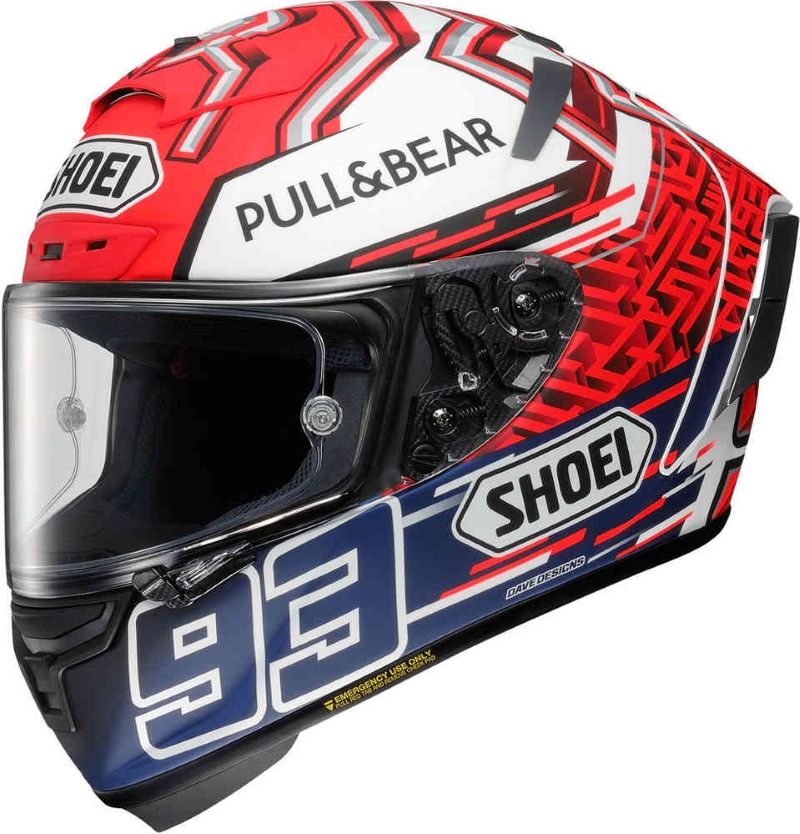
Shoei X-Spirit III Marquez, RRP €869.00. And jolly nice it probably is too, but that’s more money than I hope to pay for a helmet and a motorcycle.
The sad truth is that world just doesn’t work that way. But the people who try to sell us things every single day have to try to make us believe that it does, otherwise we might not be willing to spend money on things we don’t need or to accept that stuff somehow defines who we are and what we are worth.
Trust me on this, if you buy a motorcycle helmet with a custom paint job, people will not say; “Goodness, look, that must be Marc Marquez, nipping down to the shops for beer and biscuits.” Nor will they assume that, because you wear an identical helmet, you must be as talented, successful and popular as he is. In fact, it’s unlikely that buying such a helmet would improve the way that the world regards you or make you any happier at all. But that is the type of magical thinking that people selling these helmets want us to accept.
In fact, this kind of thinking doesn’t just permeate the modern world, it’s absolutely intrinsic to the consumer society. The idea that things make you happy, and that the bigger and shinier the thing, the happier it’s going to make you is what makes the commercial world go round. There is even a lie at the heart of this deception. No matter how cool or satisfying the things you buy, they will soon be replaced by even more desirable things. They must be, because that’s how the commercial world works.
So, no matter how many things you buy or how much money you spend, there will always be more, better things coming along. You never actually become happy. If you did, then you might stop spending money and that’s no good. What’s needed is that you remain in a state of permanent yearning, always looking to the next thing which will surely bring happiness. Actually, they tend to do the precise opposite.
So, what you’re really being sold is an illusion. If you want to find real contentment, you don’t need the latest thing. In fact, you probably need to start thinking about things in a completely different way. And that, for me, is at least partly what minimalism is about.
It isn’t only or even principally about saving money, but it is about doing more with less. If I can buy a motorcycle helmet (or a motorcycle) for less money, that’s good – I am a freelance writer and if I need less money that means I can spend less time working to pay for stuff and more time doing what I enjoy. If I buy a used motorcycle helmet (or extend the life of an elderly motorcycle) that’s good because it not only saves me money, it also uses less of the world’s resources.
As I don’t have a bike yet, I don’t know if my €5 helmet will be any good. But when I do get a bike, my judgment on whether this is or is not a good item of motorcycle gear will be based on how it does its job, not what anyone else might think about how it looks.
Striving to achieve minimalism in motorcycling, as in anything else, means looking beyond the magic and focusing on what’s true and real and what you actually need as opposed to what other people tell you that you should need. That isn’t always easy, but we’re trying…
See also: Minimalism and Motorcycles

